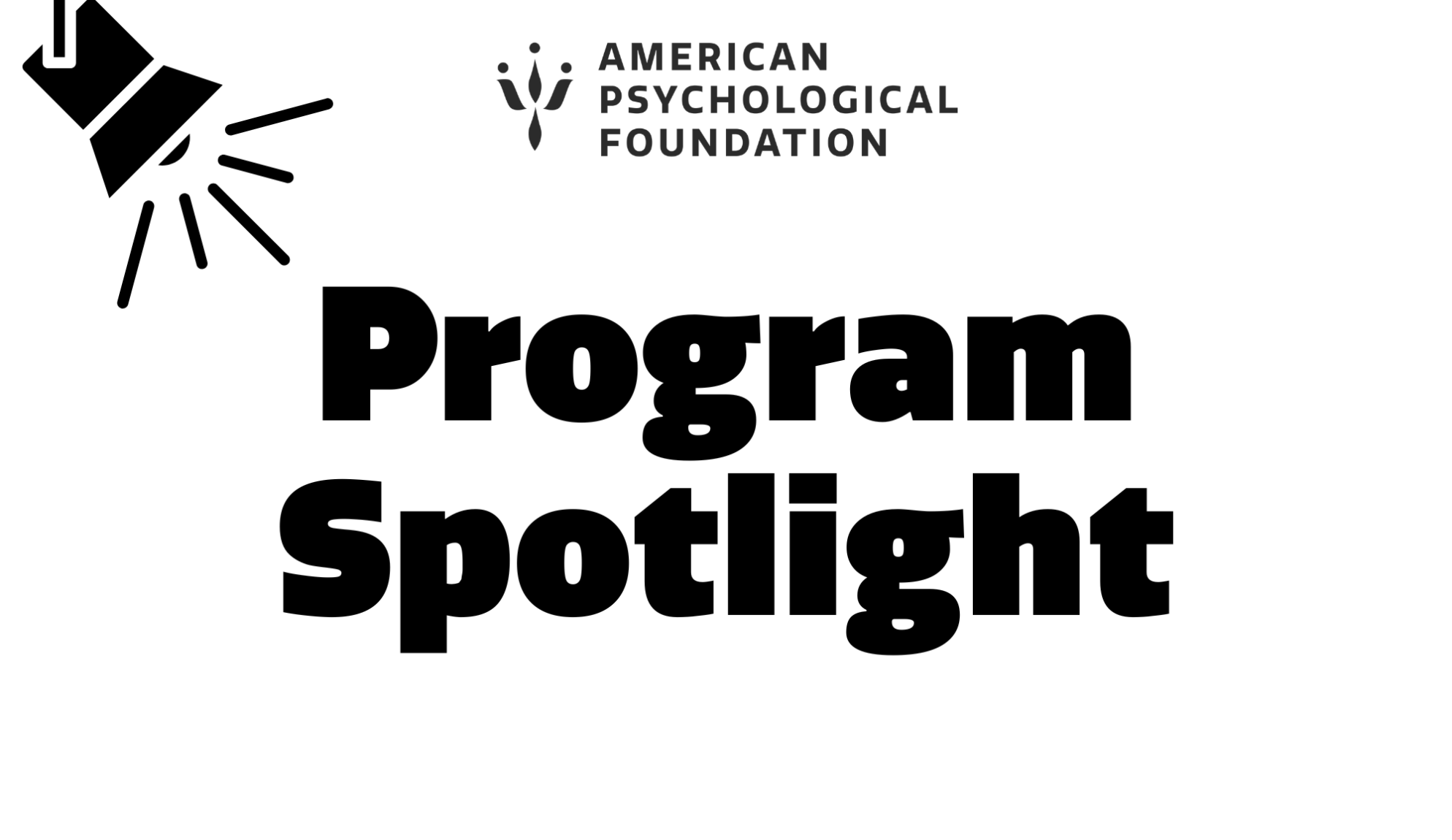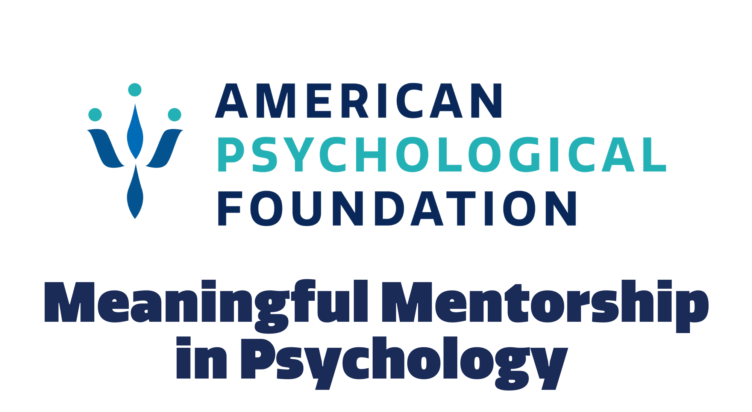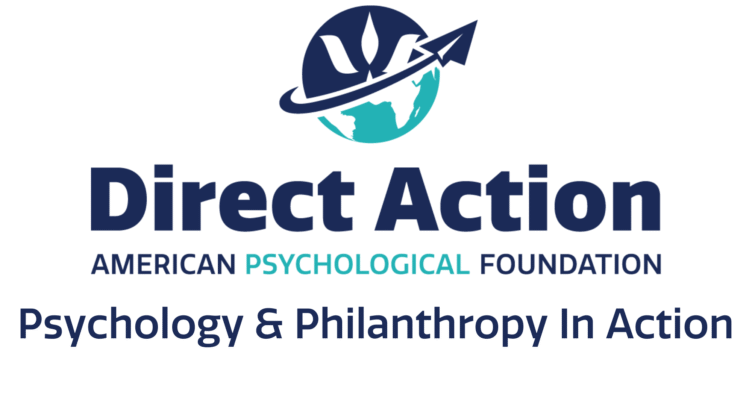New Program Spotlight: Richardson-Lowman Serious Mental Illness (SMI) Research Grant


This year, APF launched the Richardson-Lowman Serious Mental Illness (SMI) Research Grant, which will support clinical research and program evaluation in this area by doctoral level psychologists.
The APF Team sat down for a conversation with Dr. Linda Richardson, who is co-founder with Dr. Rodney L. Lowman, of the Richardson Lowman Serious Mental Illness Research Grant, about her motivations for investing in APF and her vision for advancing SMI research.
Why do you choose to invest in APF?
Several years ago, Rodney Lowman and I talked about how we could best give back to psychology. We decided that funding research projects in our areas of interest would be a great way to do that. We didn’t want to manage the fund ourselves, so we researched fund management options. We chose APF to help develop and manage our fund because APF was aligned with APA’s values and was already administering funds in psychology.
How were you planning to fund this grant?
Our original plan was to for our donation to be a legacy gift. At first, we made small contributions to the fund and over the years we were able to increase the size of these gifts. We were delighted to learn that the contributions have now reached the level that grant awards can begin.
How does APF and psychology as a whole impact individuals and society?
By focusing heavily on early career psychologists and offering small grants that can be a foundation for obtaining larger grants, APF is leading the way in funding a new generation of researchers. Many of APF’s early award winners have gone on to obtain larger grants addressing some of society’s most pressing needs.
What inspires you about APF’s mission statement: “We leverage the power of philanthropy to advance psychological knowledge by investing in innovative research and applications that prioritize people and their wellbeing?”
Small grants can be particularly helpful to test out innovative and emerging ideas that larger granting groups may be reluctant to invest in. Often researchers’ best ideas come early in their careers, when funding is hard to come by. Grant programs like ours can help with that.
What inspired you to establish the Richardson-Lowman Serious Mental Illness Research Grant?
I first became acquainted with serious mental illness as an undergraduate. I toured a state hospital in Massachusetts in the early 1970s and observed patients dressed in pajamas and bathrobes sitting in chairs along the walls, not speaking or moving, just staring into space.
The lack of treatment affected not only the individuals, but also their families and significant others. I thought, there had to be a better way. This experience led me to choose a career in mental health, and more specifically in serious mental illness.
Over my career, I have worked in a wide variety of settings serving persons with SMI. I’ve led SMI programs in outpatient clinics, inpatient units, jails, prisons, and outreach programs. I’ve also developed and led several innovative programs serving this population including those where services were provided to unhoused people in the field. I’ve been able to see firsthand the benefits of services tailored to the needs of this population.
What impact do you hope that the Richardson Lowman Serious Mental Illness Research Grant will have both on the psychological research community, but also on people who are living with and experiencing serious mental illness?
By funding research in this area, my wish is to help with the development and implementation of innovative strategies for better understanding and serving this population. My hope is that the research findings from these grants will benefit the research community (especially early career SMI researchers), but also the individuals with serious mental illness and their families.
What do you think are some of the biggest challenges that researchers face when studying serious mental illness, and how can these grants help overcome them?
Historically, SMI has not been an area of great interest for many psychologists for a variety of reasons including fear and lack of appropriate training. The community of SMI psychologists while growing, is small. Attracting more psychologists to this area is a challenge. For those working with the SMI population, the biggest challenge I see is getting one’s research off the ground. Small grants can make a big difference to those starting out.
What advice would you give to researchers looking to make an impact in the field of serious mental illness?
First and foremost, psychologists with an interest in SMI need to obtain broad exposure to this population by learning about and working in a variety of settings such as inpatient, outpatient, and community-based programs that serve this population. This will help them develop a solid understanding of the wide range of needs in this population. Obtaining experience with the support network of persons with SMI including their families, significant others, and friends, is also important. Providers often have limited understanding of the huge demands made on family members of those with SMI. It’s also helpful to find a mentor who cares about SMI. Lastly, I think it’s important for young researchers to be well trained in those services and interventions found to be effective with this population. Increasingly many interventions that have been successful in serving adults with mental illness (but not necessarily those with SMI) have been adapted successfully for use with the SMI population.
Is there anything we haven’t covered that you would like to discuss?
Stigma towards persons with serious mental illness, while declining, is still prominent. This can also occur among mental health professionals. Education is key but identifying implicit biases may be needed. If we can interest more psychologists in working with persons with SMI and their families, they will discover how rewarding this work these can be.
Want to contribute to projects like this and create impact with psychology? Donate to APF today!
Interested in starting your own fund with APF? Contact philanthropy@ampsychfdn.org!
Topics: Mental Health Program Spotlight
Discover More

Meaningful Mentorship in Psychology with APF’s Early Career Psychologist (ECP) Committee Chairs
January is National Mentoring Month, and at APF, we know that mentorship is essential in shaping the next generation of researchers and psychologists. Supporting students …

APF’s 2025 in Review: Moving Psychology Forward
From the Desk of Dr. Quist Ryder is a space for APF’s CEO to share insights and observations on APF initiatives, the state of psychology, …

Psychology & Philanthropy In Action with Dr. Kiara Álvarez
At APF, we’re bringing together the shared power of psychology and philanthropy to create a world where people are healthy, happy, and living with dignity. …
